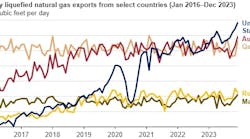Sam Fletcher
OGJ Senior Writer
The US dollar surged and the price of oil dropped immediately with news US Navy SEALs shot and killed Osama bin Laden, the most famous terrorist, in a brief raid May 1 on his hideout near a military academy in Pakistan, but analysts expect the event will little change oil markets.
The US Central Intelligent Agency pinpointed bin Laden’s custom-built hideaway, and a top Navy counter-terrorism team was dispatched by helicopter in a 40-minute raid that also killed three other men, one of whom was identified as one of bin Laden’s sons.
Officials said bin Laden was shot fatally in the head as he and the others resisted. The raiders evacuated his body, which was positively identified by DNA tests before burial at sea.
US President Barack Obama announced bin Laden’s death, saying, “Justice has been done.” Government officials said they expect terrorist reprisals.
Not surprisingly, the Hamas terrorist organization called bin Laden a “holy warrior” and condemned his killing. But many people in Israel and the US celebrated his death, including large crowds outside the White House and at Ground Zero of the Twin Towers, scene of the Sept. 11, 2001, attack in New York.
In Houston, however, analysts at Raymond James & Associates Inc. said bin Laden’s death likely would have little effect on crude prices, which were declining in early trading May 2 while natural gas and the equity markets were on the rise. Bin Laden was not even “near the top” of the list of many geopolitical risks to oil supply, they said.
“While bin Laden's strident hatred of the Saudi royal family and other pro-western Arab regimes is well known, in the grand scheme of things it was a relatively minor destabilizing factor,” said Raymond James analysts. “Currently, what is unambiguously at the top of the list of oil market concerns is the tension between the Arab ‘street's’ demands for political and social reform and most Arab leaders' stubborn refusal to offer that reform. Bin Laden, and al Qaeda more broadly, are definitely not the cause of the Arab revolutions, and therefore bin Laden's death does not weaken the revolutionary fervor.”
Others ‘more relevant’
They said, “If Libya's [Moammar] Gadhafi or [Syrian president Bashar al-Assad] were to depart the political scene, that would have significantly more relevance for the oil market than the bin Laden news.”
At Energy Security Analysis Inc., Wakefield, Mass., officials said, “The implications for the oil market are unclear. To the degree that [bin Laden’s death] weakens the terrorist threat in oil producing countries and underscores the effectiveness of US covert operations, we could see the dollar strengthen and commodities weaken. On the other hand, to the degree this event spawns a wave of poorly planned but destructive terrorist attacks, it could increase the risk premium in oil prices.” They added, “We believe bin Laden’s death is a significant blow to the global jihad of al Qaeda.”
At Chatham House, home of the Royal Institute of International Affairs in London, Maha Azzam, associate fellow of the Middle East and North Africa Program, noted, “Al Qaeda as an organization had been decimated and greatly weakened by the consistent onslaught by US counter-terrorism efforts. Plus, bin Laden’s death comes at a time when he had become increasingly sidelined in the Middle East. Nonetheless, he leaves a legacy of a loose network of fringe radicals intent on using terrorism with no objective other than to terrorize simply as a way of saying that they are there.”
Xenia Dormandy, senior fellow, US International Role at Chatham House, warned, “The threat to the US and the Western world has not changed. That will take a longer, generational effort to change attitudes, values, and ideology, on the part of all sides. America, particularly Congress, needs to be careful not to roll back its attention and resources in this time of austerity, on continuing to meet this challenge.”
(Online May 2, 2011; author’s e-mail: [email protected])

